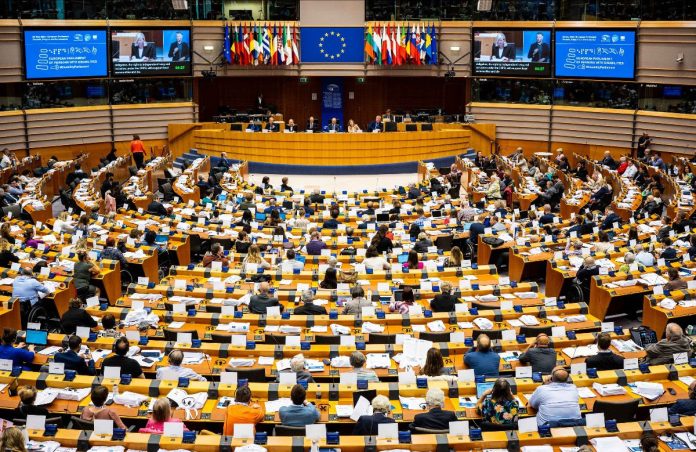On 23 May, the hemicycle of the European Parliament in Brussels hosted the “5th European Parliament of Persons with Disabilities” – an event during which 600 disability advocates from across the EU came together to discuss the European Union’s role in advancing Disability Rights.
The event was marked by the adoption of the European Disability Forum’s Manifesto on the 2024 European Elections” – the roadmap of the European Disability Forum’s campaign for next year’s scrutiny.
It shares the movement’s demand to be fully involved in the political process – from having the right to vote (still denied to many) and being able to stand as a candidate, to having accessibility measures in place to ensure a free, private and informed vote. Voters must be able to understand all aspects of the electoral process and parties’ manifestos and have accessible measures to cast a secret vote.
The manifesto also outlines key demands for the next legislative term – actions that are essential to fully ensure the rights of persons with disabilities, such as:
- Ensure that all persons with disabilities have the right to vote and the right to stand as candidates in European elections.
- Ensure strong services focusing on disability rights in EU Institutions: a new Directorate-General for Equality and Inclusion in the European Commission under the leadership of the Commissioner for Equality; a Disability Committee in the European Parliament; an Equality Configuration in the Council.
- Create a new European agency for accessibility.
- Adopt an EU-wide Disability Card, which ensures the mutual recognition of disability status across Member States.
- Introduce stronger legislation to protect the rights of persons with disabilities as passengers, notably the prohibition of denied boarding to flights and fair compensation when mobility equipment is lost or damaged during travel.
- Establish a Disability Employment and Skills Guarantee to boost the participation of persons with disabilities in the open labour market.
- Further protection for women and girls with disabilities, including the prohibition of forced sterilisation.
- Support Ukrainians with disabilities inside and outside Ukraine, and make sure the EU’s contribution to the reconstruction of Ukraine builds a more inclusive country for persons with disabilities.
- Introduce legislation to guarantee the availability and affordability of assistive technologies for persons with disabilities.
- Ensure the next EU Budget fully supports independent living for persons with disabilities and ensures disability inclusion in the Green and Digital transition.
The comprehensive list of proposals outlined by the Manifesto focuses on realising a Union of Equality; becoming a more social Europe; embracing accessibility; protecting persons with disabilities.
“Persons with disabilities want to be full citizens of the European Union – and the participation in this landmark event showed that. The will of the movement is clear: EU institutions must ensure we can participate in the democratic process and in the policies shaping our Union, and they need to build an inclusive Europe together with us,” said European Disability Forum’s President Yannis Vardakastanis.
“One of the mottos of the European Union is “United in Diversity”. Persons with disabilities are united and are part of this diversity – we should be included and have the freedom to live and move that the European Union allows to its citizens,” added European Disability Forum’s Vice President Gunta Anca.
“The European Union – and specifically the European Parliament – has taken significant steps in improving women’s rights. This event was also a reminder that we need to advance further the specific issues of women with disabilities, who still are subject to practices contrary to the CRPD, such as forced sterilisation and are many times more likely to be victims of violence,” commented European Disability Forum’s chair of the Women’s Committee, Pirkko Mahlamäki.
European Disability Forum’s chair of the Youth Committee, Elias Tebibel, shared the importance of the European disability movement for youth with disabilities: “The theme of this event was building an inclusive future – a future which youth will be the leaders of. Policymakers need to ensure we have the chance to do that – and that we need inclusive education, accessible physical and digital societies and, yes, more chances to be involved in the political process.”

